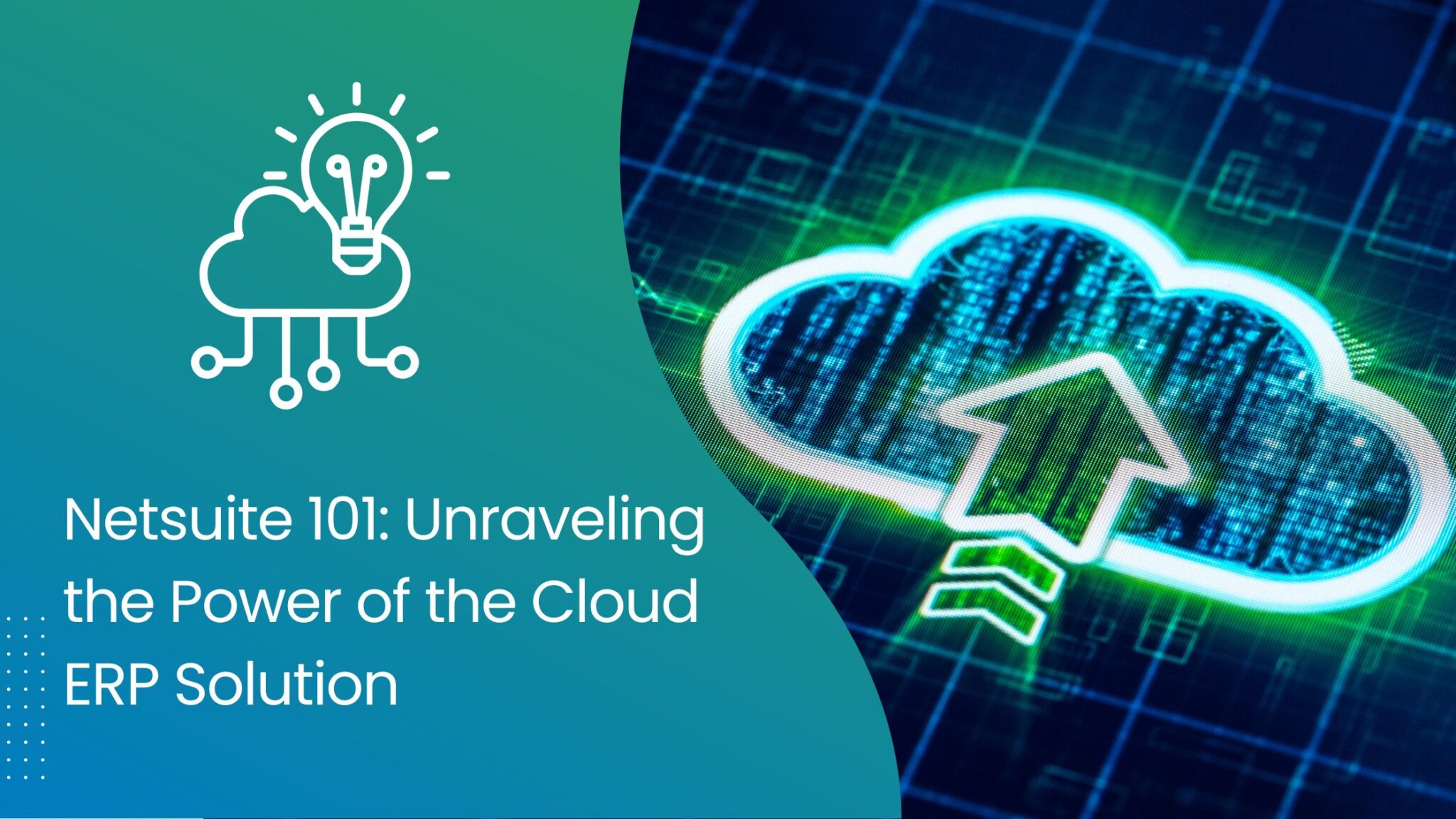Unlock the potential of your business with NetSuite, the robust cloud ERP solution that is revolutionizing the way companies operate. With its comprehensive suite of tools and applications, NetSuite is designed to streamline your operations, increase efficiency, and drive growth. In this article, we will take you through the basics of NetSuite, helping you unravel its power and understand how it can benefit your organization.
NetSuite is more than just an accounting software; it is a complete business management solution that integrates all key functions like finance, inventory management, supply chain, and customer relationship management in one unified platform. By harnessing the power of cloud ERP, NetSuite offers unparalleled flexibility, scalability, and accessibility, enabling businesses of all sizes to stay agile and competitive in today’s rapidly changing marketplace.
Whether you are a small startup or an established enterprise, NetSuite can provide you with actionable insights and real-time visibility into your operations, empowering you to make informed decisions and drive profitability. Join us as we delve into the world of NetSuite and uncover the endless possibilities it offers for business growth and success.
What is NetSuite
NetSuite is more than just an accounting software; it is a complete business management solution that integrates all key functions like finance, inventory management, supply chain, and customer relationship management in one unified platform. As a cloud-based ERP solution, NetSuite offers numerous advantages over traditional on-premise systems.
By harnessing the power of cloud ERP, NetSuite provides unparalleled flexibility, scalability, and accessibility. This means that businesses of all sizes can benefit from NetSuite’s robust features and functionalities without the need for costly infrastructure investments. With NetSuite, you can access your business data and applications anytime, anywhere, as long as you have an internet connection.

The Benefits of Using NetSuite
Implementing NetSuite can bring a multitude of benefits to your organization. Firstly, it can significantly enhance your operational efficiency. NetSuite automates and streamlines key business processes, eliminating manual and time-consuming tasks. This allows your employees to focus on more strategic activities that drive growth and innovation.
NetSuite also provides real-time visibility into your business operations. With integrated reporting and analytics tools, you can access actionable insights and make data-driven decisions. This visibility enables you to proactively identify bottlenecks, optimize processes, and seize new opportunities.
Additionally, NetSuite improves collaboration and communication within your organization. By centralizing all your data and applications in a cloud ERP platform, it becomes easier for teams to collaborate, share information, and work towards common goals. This fosters a culture of transparency and encourages cross-functional collaboration, leading to better overall performance.
The power of cloud ERP solutions
Cloud ERP solutions like NetSuite offer several advantages over traditional on-premise systems. One of the key benefits is scalability. With cloud ERP, you can easily scale up or down based on your business needs. Whether you are experiencing rapid growth or seasonal fluctuations in demand, cloud ERP can adapt to your changing requirements without the need for costly infrastructure upgrades.
Another advantage of cloud ERP is cost savings. Traditional on-premise ERP systems often require significant upfront investments in hardware, software licenses, and IT infrastructure. With cloud ERP, you only pay for what you use on a subscription basis. This eliminates the need for large capital expenditures and allows you to allocate your resources more strategically.
Cloud ERP solutions also offer better accessibility and mobility. With NetSuite, you can access your business data and applications from any device with an internet connection. This means that you and your employees can work remotely, collaborate on the go, and stay connected with your business at all times. This flexibility is especially valuable in today’s digital age, where remote work and mobility are becoming increasingly important.

Key features of Netsuite
NetSuite offers a comprehensive set of features and functionalities designed to meet the diverse needs of modern businesses. Here are some of the key features that make NetSuite a powerful cloud ERP solution:
1. Financial Management
NetSuite’s financial management module provides robust tools for managing your company’s finances. It includes features like general ledger, accounts payable and receivable, cash management, and financial reporting. With these tools, you can streamline your financial processes, improve accuracy, and gain better visibility into your financial performance.
2. Inventory Management
NetSuite’s inventory management module allows you to effectively manage your inventory and supply chain. It offers features like demand planning, order management, procurement, and warehouse management. By optimizing your inventory levels and improving supply chain visibility, you can reduce costs, minimize stockouts, and improve customer satisfaction.
3. Customer Relationship Management (CRM)
NetSuite’s CRM module helps you manage your customer relationships and sales processes. It includes features like lead management, opportunity tracking, sales forecasting, and customer support. By centralizing your customer data and automating your sales processes, you can enhance customer satisfaction, increase sales productivity, and drive revenue growth.
4. E-commerce
NetSuite’s e-commerce module enables you to create and manage your online store. It offers features like website design, shopping cart functionality, payment processing, and order fulfillment. With NetSuite’s e-commerce capabilities, you can easily sell your products or services online, reach a wider audience, and drive online revenue.
5. Business Intelligence and Reporting
NetSuite’s business intelligence and reporting tools provide real-time visibility into your business performance. It includes features like customizable dashboards, data analytics, and reporting. With these tools, you can access actionable insights, track key performance indicators, and make data-driven decisions.

Implementing NetSuite for Your Business
Implementing NetSuite for your business requires careful planning and execution. Here are some key steps to consider:
1. Define Your Business Requirements
Before implementing NetSuite, it is important to clearly define your business requirements. Identify the key pain points and challenges that you want to address with this cloud ERP. This will help you determine the specific modules and features you need to implement.
2. Choose a Deployment Option
NetSuite offers different deployment options to suit your business needs. You can choose between a full cloud ERP deployment or a hybrid deployment that combines cloud and on-premise solutions. Consider factors like scalability, cost, and security when choosing the deployment option that is right for your business.
3. Data Migration and Integration
Migrating your data from existing systems to NetSuite can be a complex process. It is important to plan and execute data migration carefully to ensure data integrity and accuracy. Additionally, consider integrating NetSuite with other systems like CRM or e-commerce platforms to streamline your processes and avoid data silos.
4. User Training and Change Management
Proper user training is crucial to ensure successful adoption of NetSuite within your organization. Provide comprehensive training to your employees to familiarize them with the system’s features and functionalities. Additionally, develop a change management plan to address any resistance or challenges that may arise during the implementation process.
Customizing NetSuite to Fit Your Business Needs
One of the key advantages of NetSuite as a cloud ERP is its flexibility and customizability. You can tailor NetSuite to fit your specific business needs by customizing workflows, adding custom fields, and creating custom reports. This allows you to adapt NetSuite to your unique processes and requirements without the need for complex coding or programming.
NetSuite’s SuiteCloud platform provides a range of customization tools and resources to help you extend and enhance the functionality of NetSuite. Whether you need to create custom workflows, integrate with third-party applications, or build custom applications, SuiteCloud provides the tools and support you need to customize NetSuite to fit your business.
NetSuite vs. Other ERP Solutions
When evaluating ERP solutions, it is important to compare NetSuite with other options available in the market. Here are some key factors to consider when comparing NetSuite with other ERP solutions:
1. Scalability
NetSuite’s cloud-based architecture offers unparalleled scalability. Whether you are a small startup or a large enterprise, NetSuite can scale with your business needs. This scalability allows you to add or remove users, modules, and functionalities as your business grows or changes.
2. Integration Capabilities
NetSuite provides robust integration capabilities, allowing you to connect with other systems and applications seamlessly. This enables you to streamline your processes, eliminate data silos, and improve overall efficiency. When comparing ERP solutions, consider the ease of integration and the availability of pre-built connectors or APIs.
3. Industry-Specific Functionality
NetSuite offers industry-specific functionality and tailored solutions for various industries like retail, manufacturing, wholesale distribution, and more. This industry focus ensures that NetSuite, as a cloud ERP, can meet the unique requirements and challenges of your specific industry. When evaluating ERP solutions, consider whether the solution offers industry-specific functionality that is relevant to your business.
4. Total Cost of Ownership
When comparing ERP solutions, it is essential to consider the total cost of ownership. This includes not only the upfront costs but also ongoing maintenance, support, and upgrade expenses. NetSuite’s subscription-based pricing model and cloud-based infrastructure can provide cost savings compared to traditional on-premise ERP systems.
NetSuite Pricing and Packages
NetSuite offers different pricing and package options to suit the needs of businesses of all sizes. The pricing for NetSuite is based on a subscription model, where you pay a monthly or annual fee depending on the number of users and the specific modules and functionalities you require.
NetSuite’s pricing is tiered based on the size of your business and the level of functionality you need. The specific pricing details can vary depending on your location, industry, and specific requirements. It is recommended to contact a NetSuite representative or partner to get a customized pricing quote based on your business needs.
NetSuite Training and Support
Why settle for traditional support when you can partner withBOOST, a dedicated managed support provider that truly understands your business needs? Traditional support often fails because they don’t know you or your company, and their approach is 100% reactive without addressing your strategic business objectives.BOOST, on the other hand, offers state-side dedicated resources through a business-first discovery process for your organization.
Our proactive, case-driven methodology guides the transformation of your NetSuite investment, ensuring continuous delivery by resources who are familiar with your account. We don’t just wait for issues to arise—our team is constantly seeking out suggestions and insights to enhance your NetSuite instance.
Experience Managed Support That Knows Your Business
Conclusion: Harnessing the Power of NetSuite for Your Business Success
NetSuite is a powerful cloud ERP solution that can transform your business operations and drive growth. Its comprehensive suite of tools and applications enables you to streamline your processes, gain real-time visibility, and make data-driven decisions. Whether you are a small startup or an established enterprise, NetSuite offers the scalability, flexibility, and accessibility you need to stay competitive in today’s rapidly changing marketplace.
By implementing NetSuite, you can unlock the full potential of your business and drive success. From financial management to inventory management, customer relationship management to e-commerce, NetSuite provides the tools and functionalities you need to manage your business efficiently and effectively. With its customizability and industry-specific solutions, NetSuite can adapt to your unique business requirements and help you achieve your goals.
Don’t miss out on the power of NetSuite. Take the first step towards transforming your business today and harness the endless possibilities that NetSuite offers for business growth and success.
Frequently Asked Questions (FAQs)
NetSuite is a comprehensive cloud-based ERP solution that goes beyond traditional accounting software to integrate essential functions like finance, inventory management, supply chain, and customer relationship management into a unified platform.
NetSuite streamlines operations, increases efficiency, and enhances decision-making by providing real-time insights and automating routine tasks, freeing up time for strategic initiatives.
Key features include financial management, inventory management, customer relationship management (CRM), e-commerce, and business intelligence and reporting, among others.
NetSuite’s cloud ERP offers scalability, flexibility, and accessibility, enabling businesses to scale as they grow without needing large infrastructure investments.
By centralizing data and applications in the cloud, NetSuite makes it easier for teams to share information, work together on projects, and stay aligned on organizational goals.
NetSuite offers industry-specific functionality and solutions tailored to sectors like retail, manufacturing, wholesale distribution, and more.
NetSuite can be deployed fully in the cloud or as a hybrid solution, allowing businesses to choose based on their scalability, cost, and security requirements.
NetSuite’s pricing is based on a subscription model, with fees depending on user count, specific modules, and functionalities needed. Pricing is customizable to suit each business's requirements.
NetSuite provides extensive support through its SuiteSupport program, including training courses, troubleshooting assistance, a knowledge base, user forums, and community resources.
NetSuite is highly customizable, allowing businesses to tailor workflows, add custom fields, and create reports. The SuiteCloud platform supports integrations and custom applications to meet unique business needs., and your current software’s integration capabilities. It's also important to select an ERP system that offers robust automation, real-time reporting, and scalability, such as NetSuite or other leading ERP solutions.

